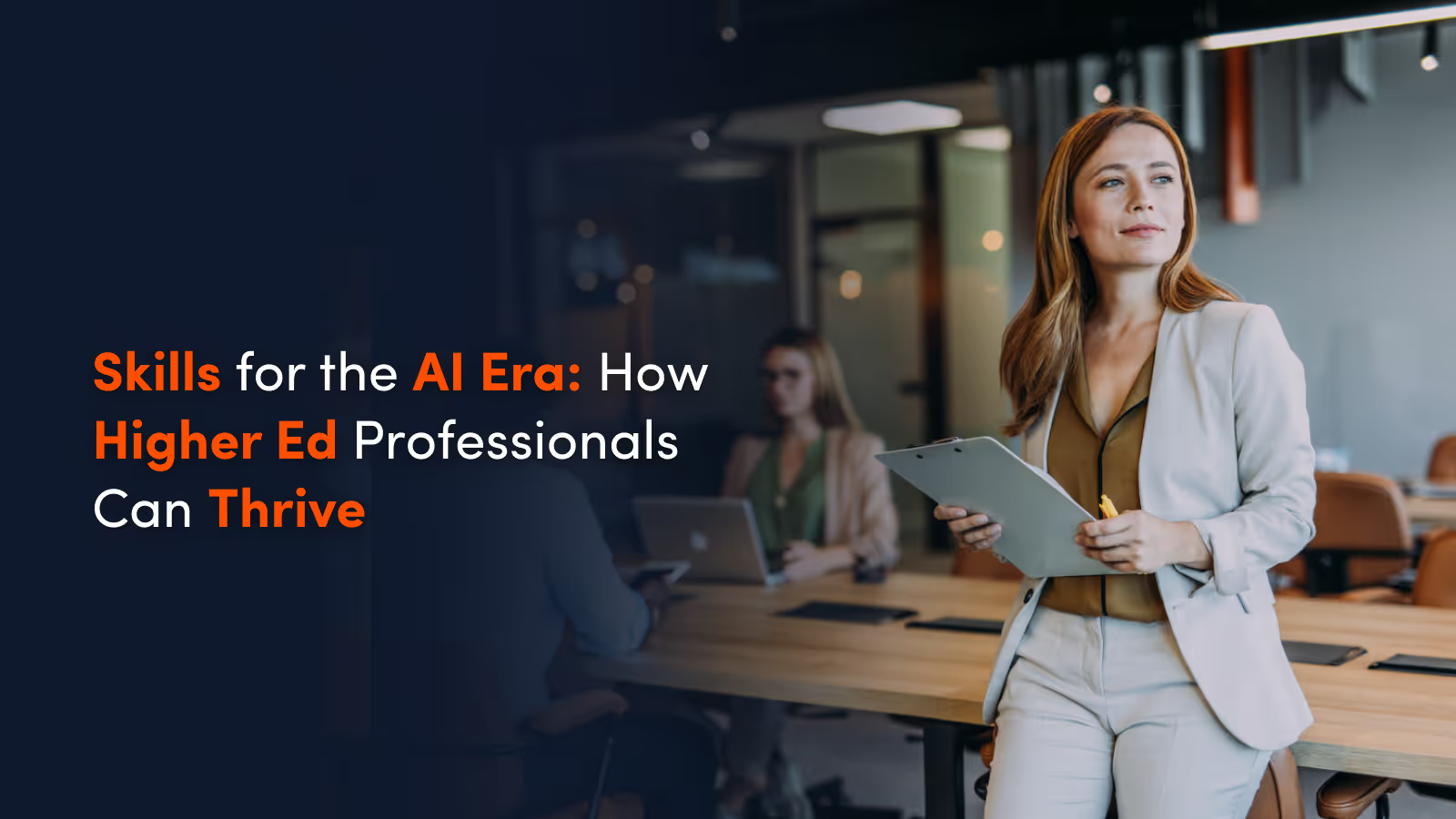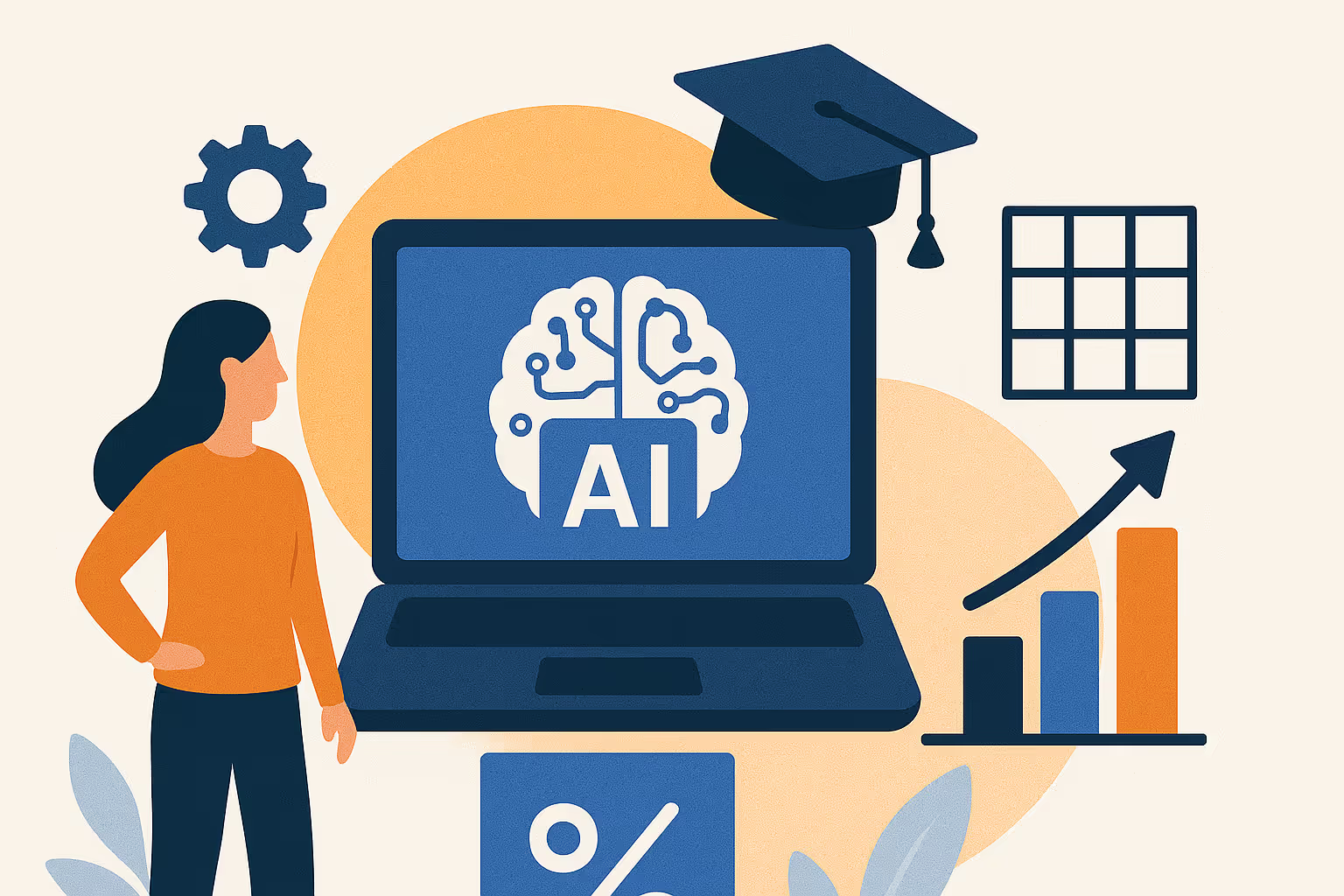About the Blog
Artificial intelligence (AI) is changing the landscape of higher education, from enrollment marketing to student success initiatives. Whether you're an admissions officer, a marketing professional, or an academic leader, understanding AI and its impact can help you stay ahead. Here’s a practical guide to the certifications, soft skills, and evolving roles that can support your career growth in AI adoption.
Certifications to Build Your AI Knowledge
Getting certified in AI-related topics can boost your credibility and help you integrate AI tools effectively. Here are a few accessible options:
- Enrollify Prompt Engineering Course
- Become part of the elite group of forward-thinking professionals (from any industry!) who understand and have mastered the skill of the future — prompt engineering.
- AI for Everyone (Coursera)
- A beginner-friendly introduction to AI concepts and applications in various industries, including education.
- Google AI Essentials (Coursera)
- Covers AI and machine learning fundamentals with practical applications.
- Microsoft AI Fundamentals (AI-900 Certification)
- A great entry-level certification for understanding AI and its role in business and education.
- IBM Applied AI Professional Certificate (Coursera)
- Explores AI tools, including chatbots and natural language processing.
- AI in Education (FutureLearn)
- Focuses specifically on how AI is transforming teaching, learning, and administration.
These certifications can help you gain foundational knowledge and apply AI-driven solutions to your work in student recruitment, retention, and engagement.
Soft Skills to Thrive in AI-Enhanced Roles
AI may automate certain tasks, but human skills will always be essential in higher ed.
Carrie Phillips, Chief Communications and Marketing Officer at the University of Arkansas at Little Rock, shared strategies during her AI Engage Summit presentation. Through real-world insights, Carrie explained how AI can enhance productivity, and staffing shortages, and ultimately empower teams to leverage these tools confidently. She also integrated key change management models to guide leaders in implementing AI sustainably within their organizations.
Here are the top soft skills that will help you succeed as AI adoption grows:
- Empathy
- AI can analyze student data, but only people can provide the emotional intelligence needed to support students holistically.
- Leadership
- AI adoption requires leaders who can guide their teams through change, champion ethical AI use, and foster a culture of innovation.
- Adaptability
- AI is evolving rapidly, and professionals who stay open to learning new tools and strategies will have a competitive edge.
- Critical Thinking
- With AI-generated insights, professionals must evaluate data critically, challenge biases, and make informed decisions.
- Collaboration
- AI implementation isn’t a solo effort. Working effectively across departments—IT, admissions, marketing, and academics—will be crucial for success.
Developing these soft skills will ensure that AI enhances, rather than replaces, the human touch in higher education.
Evolving Roles in AI Adoption for Higher Ed Professionals
As AI becomes more integrated into higher education, new roles are emerging. Here are some positions that will become increasingly relevant:
- Work With AI Knowledge Bases
- This person manages the AI Knowledge Base at an institution to make sure it's pulling the right info, is updated accordingly, etc.
- Student Success Data Analyst
- Leverages AI to track student engagement, identify at-risk students, and develop retention strategies.
- EdTech Implementation Specialist
- Helps institutions adopt AI-driven learning management systems, AI assistants, and virtual assistants.
- Ethical AI Officer
- Ensures that AI applications in education are transparent, unbiased, and aligned with institutional values.
- Personalization and Content Strategist
- Uses AI to create customized learning experiences, marketing campaigns, and student engagement initiatives.
If you're in higher ed, these roles may not be official job titles yet—but the skills behind them will be increasingly valuable as AI adoption grows.
Take Action: Future-Proof Your Career in Higher Ed
AI isn’t replacing higher ed professionals —it’s creating new opportunities for those who are willing to adapt. By earning relevant certifications, strengthening soft skills, and exploring AI-driven roles, you can position yourself as a leader in the AI-powered future of education.
Want to dive deeper? Explore other Enrollify AI-related courses, join conversations on AI in higher ed, and start experimenting with AI tools in your current role. The future of higher education will be shaped by professionals who embrace change — and that could be you.
Some of our favorite resources:
FAQ
1. Do I need technical skills to work with AI in higher education?
No, many AI tools are user-friendly, and understanding how to apply them in enrollment, student success, or marketing is more important than coding expertise.
2. How can I start integrating AI into my higher ed role?
Begin by exploring AI-powered tools like chatbots, predictive analytics, and personalized marketing platforms, and consider earning a beginner-friendly AI certification.










